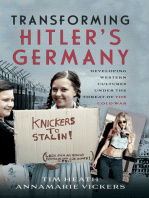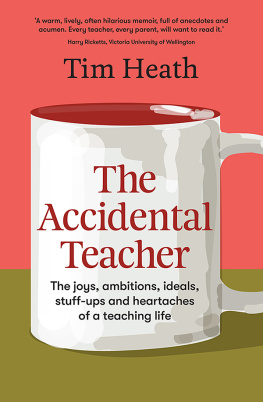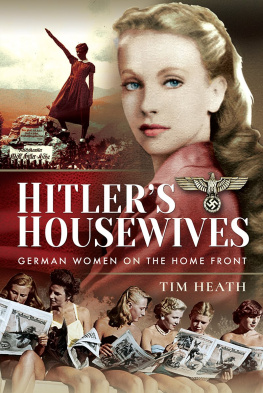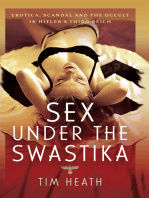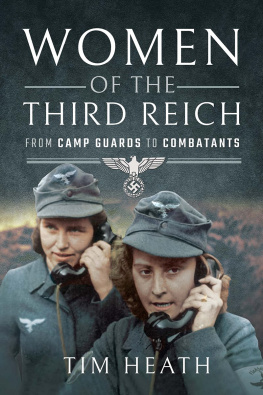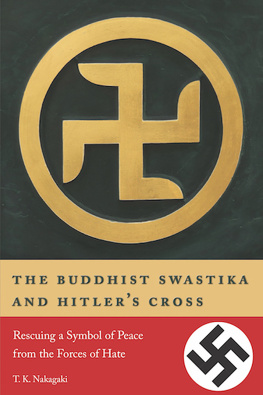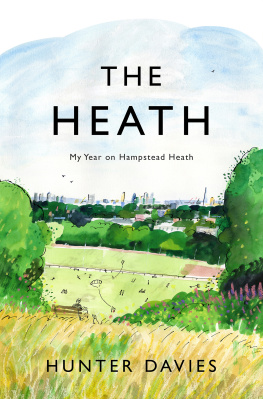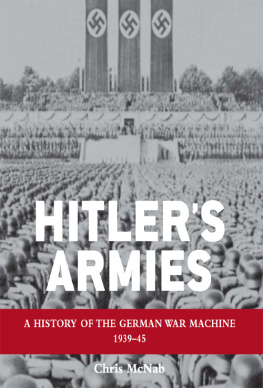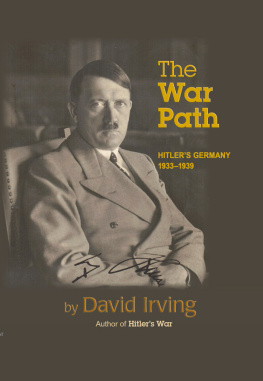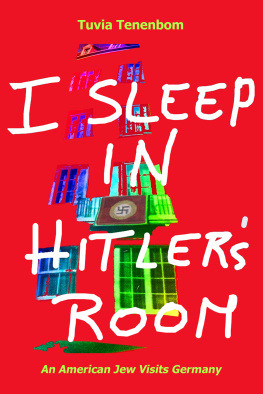Tim Heath - Transforming Hitlers Germany: Developing Western Cultures under the Threat of the Cold War
Here you can read online Tim Heath - Transforming Hitlers Germany: Developing Western Cultures under the Threat of the Cold War full text of the book (entire story) in english for free. Download pdf and epub, get meaning, cover and reviews about this ebook. genre: Home and family. Description of the work, (preface) as well as reviews are available. Best literature library LitArk.com created for fans of good reading and offers a wide selection of genres:
Romance novel
Science fiction
Adventure
Detective
Science
History
Home and family
Prose
Art
Politics
Computer
Non-fiction
Religion
Business
Children
Humor
Choose a favorite category and find really read worthwhile books. Enjoy immersion in the world of imagination, feel the emotions of the characters or learn something new for yourself, make an fascinating discovery.
- Book:Transforming Hitlers Germany: Developing Western Cultures under the Threat of the Cold War
- Author:
- Genre:
- Rating:4 / 5
- Favourites:Add to favourites
- Your mark:
- 80
- 1
- 2
- 3
- 4
- 5
Transforming Hitlers Germany: Developing Western Cultures under the Threat of the Cold War: summary, description and annotation
We offer to read an annotation, description, summary or preface (depends on what the author of the book "Transforming Hitlers Germany: Developing Western Cultures under the Threat of the Cold War" wrote himself). If you haven't found the necessary information about the book — write in the comments, we will try to find it.
Transforming Hitlers Germany: Developing Western Cultures under the Threat of the Cold War — read online for free the complete book (whole text) full work
Below is the text of the book, divided by pages. System saving the place of the last page read, allows you to conveniently read the book "Transforming Hitlers Germany: Developing Western Cultures under the Threat of the Cold War" online for free, without having to search again every time where you left off. Put a bookmark, and you can go to the page where you finished reading at any time.
Font size:
Interval:
Bookmark:
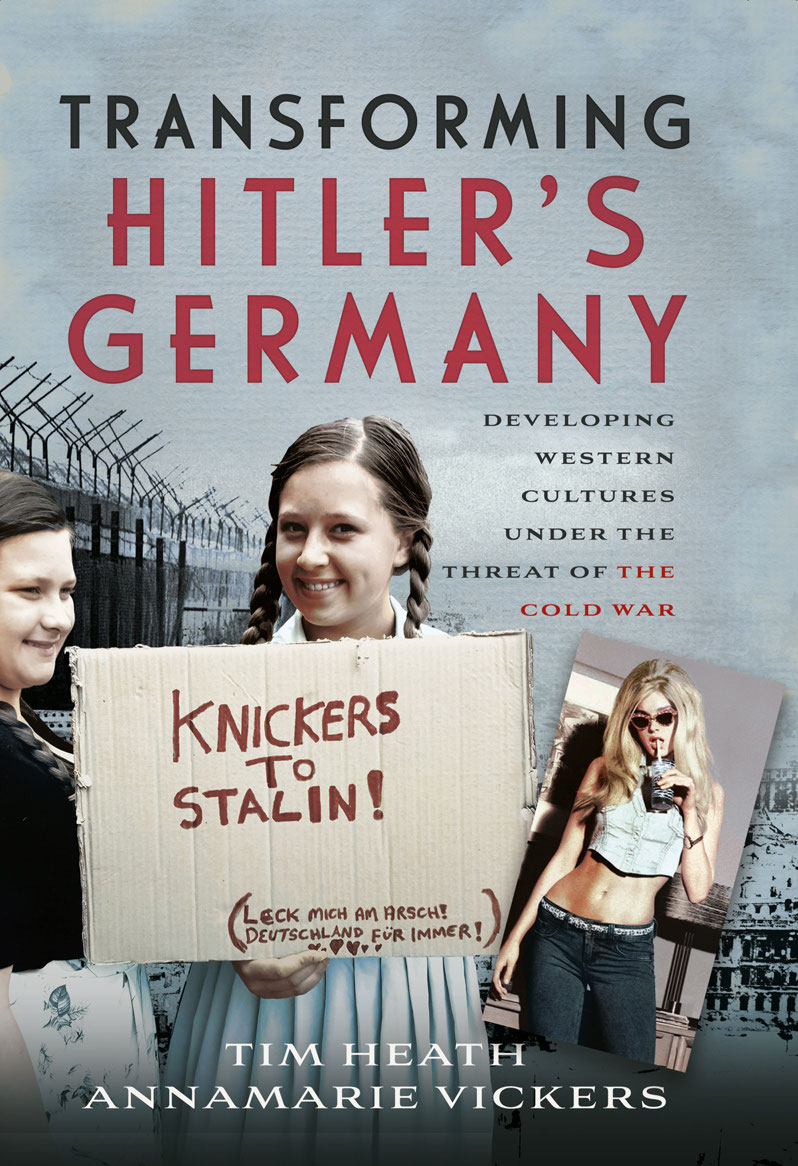
TRANSFORMING
HITLERS GERMANY
HITLERS GERMANY
DEVELOPING WESTERN CULTURES
UNDER THE THREAT OF THE COLD WAR
TIM HEATH AND ANNAMARIE VICKERS

First published in Great Britain in 2022 by
PEN AND SWORD HISTORY
An imprint of
Pen & Sword Books Ltd
Yorkshire Philadelphia
Copyright Tim Heath and Annamarie Vickers, 2022
ISBN 978 1 52677 777 5
Epub ISBN 978 1 52677 778 2
Mobi ISBN 978 1 52677 778 2
The right of Tim Heath and Annamarie Vickers to be identified as Authors of this work has been asserted by them in accordance with the Copyright, Designs and Patents Act 1988.
A CIP catalogue record for this book is available from the British Library.
All rights reserved. No part of this book may be reproduced or transmitted in any form or by any means, electronic or mechanical including photocopying, recording or by any information storage and retrieval system, without permission from the Publisher in writing.
Pen & Sword Books Limited incorporates the imprints of Atlas, Archaeology, Aviation, Discovery, Family History, Fiction, History, Maritime, Military, Military Classics, Politics, Select, Transport, True Crime, Air World, Frontline Publishing, Leo Cooper, Remember When, Seaforth Publishing, The Praetorian Press, Wharncliffe Local History, Wharncliffe Transport, Wharncliffe True Crime and White Owl.
For a complete list of Pen & Sword titles please contact
PEN & SWORD BOOKS LIMITED
47 Church Street, Barnsley, South Yorkshire, S70 2AS, England
E-mail: enquiries@pen-and-sword.co.uk
Website: www.pen-and-sword.co.uk
Or
PEN AND SWORD BOOKS
1950 Lawrence Rd, Havertown, PA 19083, USA
E-mail: Uspen-and-sword@casematepublishers.com
Website: www.penandswordbooks.com
In 1945 Germanys invaders were met with a hell-storm of gunfire; in 2015 they were greeted by pacifists holding candles.
Eulogy of a Nation
As the last flames of the Second World War flickered and died, Germany resembled a terminally ill patient on life support. She had entered into a pact with the devil, emerging from the nightmare of National Socialism twelve years later as the accused in perhaps the greatest murder trial of the twentieth century. She had witnessed hope, persecution, bombs, fire, death, rape and occupation, with the sense of abandonment which left her feeling as if she were yet another lost child, whose existence had been swallowed in the destruction, which just a few months previous had raged in virtually every street of German territory. Many emerged into a half-light of hell, a stunned silence of which echoed a defeat where Hitlers name was no longer mentioned in either jest or scorn. It was as if Adolf Hitler and the National Socialists had never existed. Only the tattered and torn remains of Swastika drapes which now lay discarded in the gutters and rubble where homes once stood, remained as some grim testimony to the madness which had consumed the German nation.
The Hitler Youth generation would be cursed with the exploded boil of National Socialism; in the view of the victors this was to be an obligatory curse, an indelible birthmark to be worn unto death in recompense for their own costly naivety.
As the Wolfkinder (wolf children) gathered around bonfires fuelled with the ever-increasing piles of Nazi flags and literature, they stood impassive, staring into the flames, as if mourning their own lost childhoods. They watched as the plumes of thick, black smoke rose up into the blue sky above. One of the girls clutched a small plastic doll, holding it close to her chest as she gently swayed from side to side as if attempting to nurse a real infant to sleep. These Wolfkinder appeared as daylight ghosts among those citizens going about their daily business; no one cared about them or whether they lived or died. It painted a scene of dejection, void of all hope and unworthy of human compassion.
Tia Schuster and Lisa Kraus were two young Berliners and, like many of West Germanys post-Second World War youth, they would have to be shoehorned into what would be the second new era of their young lives. The first had brought about only death and destruction, yet this second possessed a cold unfamiliarity. They were made to sit and watch the Holocaust films in stuffy tents crammed with thirty or more other children at a time, films which would haunt the German conscience for decades to come. Yet hope had to begin somewhere, and Tia and Lisa, along with thousands of other young girls and boys, would have to sometimes fight to claim their rightful place within this new mechanism. Germanys females under the Nazis had been raised as bearers and carers of children, but the obligatory posts of nursing or childcare appealed little to Tia and Lisa, these being the requisite duties of a regime which had brought only death and misery to the masses. The girls good looks almost assured their employment in the many brew houses, coffee shops and cinemas which began to open for business, places which would soon be frequented not only by the locals but the hordes of young foreign servicemen and -women who would be posted to western Germany throughout the years following the end of the Second World War.
The steadily escalating tensions between East and West provided some distraction from the funeral pyre of Third Reich Germany. With the uncaged bear of the Soviet Union flexing its muscles across a barrier consisting of little more than a roll of barbed wire, and the subsequent division of East from West, those living in western Germany soon understood that they were the geological bulkhead, a vital component in the prevention of communism spreading throughout the infant peace of post-war Europe.
Despite all the destruction and political tensions which surrounded them, the youth of West Germany were keen to experience the world beyond their own precarious borders. As the late 1940s gave way to the 1950s and 1960s, a series of new, decadent eras were on the horizon. Rock n roll, fashion, music festivals, flower power with its flagship sexual revolution attractively packaged as free love and fuelled by marijuana and LSD, were viewed as subversive elements which posed a threat to the traditional German way of life. Western decadence threatened to bury not only the home, church and children ethos so beloved of the Nazi regime and post-war West German governments, but it also threatened to reverse the image of German males as the traditional masculine upholders of German culture.
The young people of western Germany were anxious to experience the freedoms and excesses brought about as a result of western youth cultures. Soon teenage girls and boys all over West Germany were keen to rebel against their perceived traditional roles still expected of them by state and parents. Both state and parents soon had to understand that whether they approved or not, the new youth of post-war western Germany were Germanys future, who now demanded equality, respect and a freedom many had never thought possible within their society both past and present. It was a freedom that those unfortunate to find themselves living in communist East Germany would not have the pleasure of experiencing for many years.
Is it not then touching that within this heady mix of newfound freedom, makeup, beauty products, trendy fashion and vibrant music that the youth of West Germany would perhaps unwittingly become the symbol of everything that both fascism and communism despised?
Next pageFont size:
Interval:
Bookmark:
Similar books «Transforming Hitlers Germany: Developing Western Cultures under the Threat of the Cold War»
Look at similar books to Transforming Hitlers Germany: Developing Western Cultures under the Threat of the Cold War. We have selected literature similar in name and meaning in the hope of providing readers with more options to find new, interesting, not yet read works.
Discussion, reviews of the book Transforming Hitlers Germany: Developing Western Cultures under the Threat of the Cold War and just readers' own opinions. Leave your comments, write what you think about the work, its meaning or the main characters. Specify what exactly you liked and what you didn't like, and why you think so.

